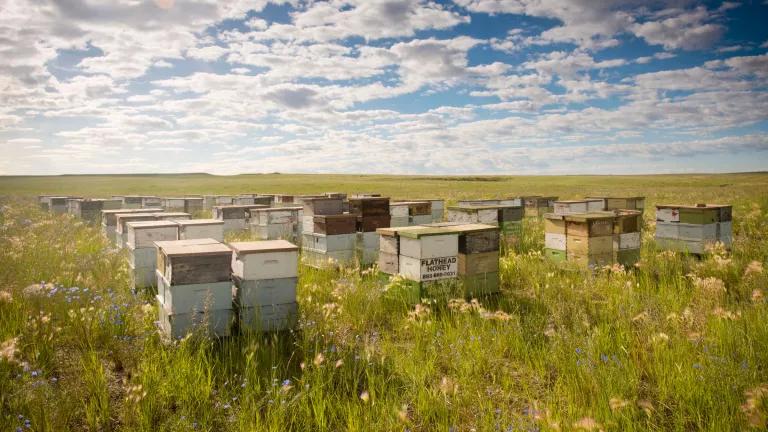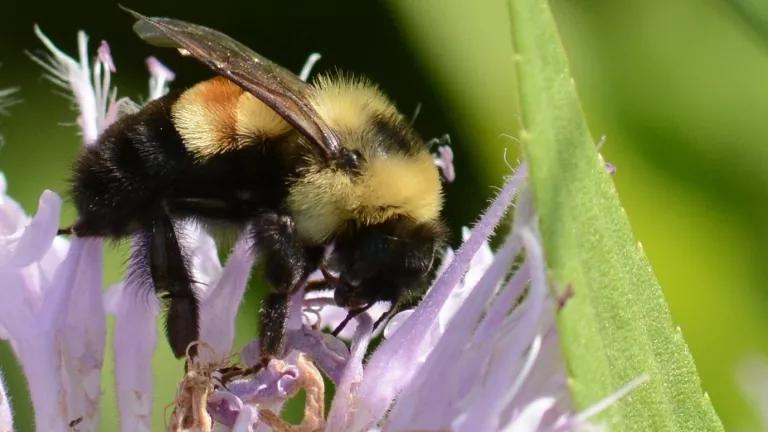Four Ways the House Farm Bill Would Weaken Pesticide Protections
The House majority's draft would undermine critical protections for people and wildlife.

Pesticides being aerially sprayed over crops
Update: The Republican Majority in the House Agriculture Committee has amended their draft Farm Bill to include yet another provision to weaken protections from pesticides. The amendment, sponsored by Rep. Rouzer (R-NC), would exempt pesticide applications from all limitations or permitting requirements outside FIFRA, the federal pesticide statute. This includes basic notification requirements under the Clean Water Act that help protect water quality while allowing pesticide users to respond to pest emergencies. The unnecessary amendment could also strip other vital location-specific protections for people and wildlife.
The House Agriculture Committee’s draft Farm Bill misses the mark on climate policy, food access, and—crucially for our dwindling pollinator population—pesticide protections. For decades, the Farm Bill has contributed to widespread adoption of industrial agriculture, which relies heavily on harmful chemicals that kill pollinators and threaten our health. The latest proposal put forward by the House Agriculture Committee Republican Majority isn’t just missing stronger oversight of pesticide use—it actively dismantles what’s already in place.
Here are four things to know about how the House majority’s Farm Bill would, if passed, undermine our ability to protect communities and ecosystems from dangerous pesticides.
- It would strip local power to restrict pesticide use. Under the Federal Insecticide Fungicide and Rodenticide Act (FIFRA), the U.S. Environmental Protection Agency (EPA) sets the floor for pesticide regulation. In other words, states and localities generally cannot permit pesticide uses prohibited by EPA. But FIFRA allows states and localities to impose stricter restrictions on pesticide use. These levels of government often have far better, on-the-ground information about pesticide risks unique to their area. For that reason, hundreds of municipalities nationwide have passed restrictions on pesticide uses near schools, parks, and ecologically sensitive areas to protect their communities and wildlife from pesticide harms. But the House Majority’s Farm Bill would prohibit these local restrictions entirely—leaving localities powerless.
- It could shield Big Ag from liability stemming from pesticide harms. Pesticide exposure presents widespread, serious risks to human health, especially for farm workers, landscapers, and other heavily exposed populations. Harms from pesticide use have resulted in lawsuits against the companies that manufacture and market them, sometimes resulting in significant settlements or jury awards. Bayer, the multinational pesticide manufacturer, is paying billions of dollars to people who were exposed to glyphosate, a common herbicide, and later developed a blood cancer called Non-Hodgkin Lymphoma. Language in the House Majority’s proposed Farm Bill could prevent the kinds of lawsuits that have compensated victims of pesticide exposure.
- It would undermine efforts to protect imperiled plants and wildlife from toxic pesticides. When EPA approves pesticides, it must analyze the impacts on species listed under the Endangered Species Act (ESA) to ensure that approvals of pesticides do not push listed species and their habitat further toward the brink. EPA must make that determination based solely on the biological needs of a species. But a provision in the House Majority's Farm Bill proposal would weaken this core ESA protection by requiring EPA to consult with other federal agencies not focused on wildlife protection and subjecting the ESA review to a far more lenient standard. In sum, it would worsen an already dire threat to our most vulnerable species.
- It would give Big Ag interests even more say in how and whether pesticides are restricted. Pesticide manufacturers already have outsized influence over federal pesticide policy. But the House Majority’s proposed Farm Bill would require EPA to consult with the U.S. Department of Agriculture and other agencies before taking certain actions that impact pesticide use and to prepare economic analyses of pesticide restrictions, making it even harder for EPA to protect the public from pesticide harms.
The Farm Bill drives our agriculture and food systems, and this Farm Bill cycle, we have an opportunity to transform it into a vehicle for positive change that people and the environment urgently need. Instead, the House Agriculture Committee Republican Majority’s approach to pesticide deregulation does nothing but line the pockets of multibillion-dollar pesticide companies at our expense. Fortunately, there’s still time. The House’s proposed version of the Farm Bill will need to be reconciled with a forthcoming Senate version that promises to put climate and health front and center. Anyone who cares about the environment and health should pay attention—and let Congress know that the next Farm Bill shouldn’t put pesticides over people and pollinators.




